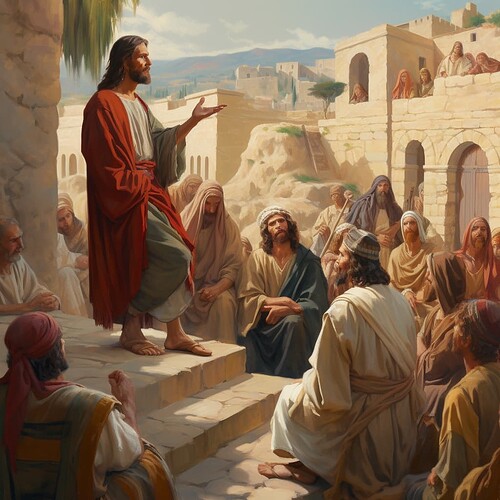![]() January 14: Matthew 16: Unveiling the Messiah and the Foundation of the Church
January 14: Matthew 16: Unveiling the Messiah and the Foundation of the Church
Discovering Christ’s Identity and His Church’s Mission
 Introduction
Introduction
January 14th brings us to Matthew 16, a pivotal chapter in the New Testament. This passage reveals significant truths about Jesus’ identity as the Messiah and lays the groundwork for the establishment of the Church, offering profound insights into faith and discipleship.
 Matthew 16: The Revelation of the Messiah
Matthew 16: The Revelation of the Messiah
Matthew 16 is a turning point in the Gospel narrative. It includes Peter’s confession of Jesus as the Christ, Jesus’ prediction of His death and resurrection, and His teachings on the cost of discipleship. This chapter emphasizes the recognition of Jesus’ divine identity and the mission of the Church.
Key Verse: “Simon Peter answered, ‘You are the Messiah, the Son of the living God.’” — Matthew 16:16
 Key Themes and Reflections:
Key Themes and Reflections:
The Messianic Confession: Peter’s declaration that Jesus is the Messiah reveals a deep understanding of Jesus’ true nature and His divine mission.
The Church’s Foundation: Jesus’ response to Peter’s confession highlights the foundational role Peter and his faith will play in the establishment of the Church.
Cost of Discipleship: Jesus teaches about the sacrifices required to follow Him, emphasizing that true discipleship involves self-denial and a willingness to take up one’s cross.
 Today’s Application:
Today’s Application:
Consider the impact of recognizing Jesus as the Messiah in your life. Reflect on what it means to be a part of His Church and how you can actively engage in its mission. Contemplate the personal cost of discipleship and how you can live out your faith authentically.
 Hidden Gem:
Hidden Gem:
Did you know? The region of Caesarea Philippi, where Peter confesses Jesus as the Messiah, was known for its pagan worship. This setting contrasts the revelation of Jesus as the true God against the backdrop of a world filled with false gods.
 Reflective Q&A:
Reflective Q&A:
![]() Understanding Christ’s Identity
Understanding Christ’s Identity
![]() How does recognizing Jesus as the Messiah influence our understanding of His teachings and our relationship with Him?
How does recognizing Jesus as the Messiah influence our understanding of His teachings and our relationship with Him?
A: Acknowledging Jesus as the Messiah deepens our understanding of His teachings as divine truths and strengthens our personal relationship with Him, knowing He is the Savior sent by God.
The Role of the Church
![]() What insights does Matthew 16 provide about the role and importance of the Church in the Christian faith?
What insights does Matthew 16 provide about the role and importance of the Church in the Christian faith?
A: Matthew 16 shows that the Church is built on the recognition of Jesus as the Christ. It plays a crucial role in continuing His mission on earth, being a community where faith is nurtured and God’s kingdom is manifested.
 Join the Discussion:
Join the Discussion:
What does Matthew 16 teach you about Jesus’ identity and the nature of true discipleship? How do you see yourself contributing to the mission of the Church? Share your reflections and experiences in the comments below!
#Matthew16 #JesusTheMessiah #ChurchFoundation #Discipleship #BibleStudy #SpiritualJourney #FaithInAction
![]() See You Tomorrow in Matthew: Continue with us as we explore the profound teachings and life-changing events in the Gospel of Matthew.
See You Tomorrow in Matthew: Continue with us as we explore the profound teachings and life-changing events in the Gospel of Matthew.
 Join the forum!
Join the forum!
Participate in our AIgniteScripture Community for deeper engagement with Scripture:
Free Members: Join in discussions, access resources, and connect with a faith community. Sign up here: 🌟 How to Join Page - Membership Options
Supporters Membership ($20/month or $200/year): Gain access to in-depth content, exclusive discussions, and a supportive faith network. Enhance your scriptural journey. Register: 🌟 How to Join Page - Membership Options
![]() Stay Connected with our AIgniteScripture Newsletter: Get daily scripture readings and insights. Join our Bible study journey. Subscribe: https://newsletter.aignitescripture.com/
Stay Connected with our AIgniteScripture Newsletter: Get daily scripture readings and insights. Join our Bible study journey. Subscribe: https://newsletter.aignitescripture.com/
